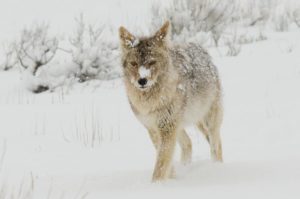Predator control bill advances in wake of aerial gunning dispute

Wharff, a staunch states’ rights advocate, told WyoFile he heard “grumblings” about the controversy, which he expected to come up at the Wyoming Legislature’s Agriculture, State and Public Lands and Water Resources Committee meeting in September. But the lawmakers who convened at Central Wyoming College in Riverton tip-toed around questions about federal authority as they delved into a related bill, he said.
Fellow lawmakers, Wharff recalled, “really didn’t want to talk” about the aerial gunning dispute. In the days leading up to the interim legislative meeting, the agencies involved had a “come-to-Jesus meeting without us,” he said. Tensions surrounding county predator boards’ authority to fly aerial missions over federal lands “was resolved without us doing anything,” Wharff said.
But lawmakers decided to pursue legislation anyway. Senate File 10-Predator control, passed through committee that day without Wharff having to scuffle over it. He spoke in support of the proposed legislation, which sets up a system allowing Wyoming’s 19 county predator management boards to work through the Wyoming Department of Agriculture to contract for predator control services
“All the bill does is clarify the current statute — it doesn’t change the statute — to make sure that the county predator control boards are part of the chain,” said Amy Hendrickson, who directs the Wyoming Wool Growers Association and lobbied in support of the legislation.
The proposed legislation makes a path through the bureaucratic obstacles that kept county predator boards from legally killing coyotes and wolves from the air over federal land — if federal agencies like the Animal Plant Health and Inspection Service’s Wildlife Services [APHIS] go for it.
“How do you think APHIS is going to respond?” Wharff asked Wyoming Stock Growers Association Executive Vice President Jim Magagna, a bill supporter. “I know federal agencies have a tendency to think they rule the world.”
The livestock industry, Magagna responded, had experienced “real challenges” working with the federal Wildlife Services, particularly in the prior six months.
“But my understanding and my belief is that [Wyoming Department of Agriculture] Director [Doug] Miyamoto has made significant progress toward getting them on board,” Magagna told lawmakers. “There’s always some risk they could see this and say, ‘We’re just going to fight you,’ but I’m more inclined to think that this will reinforce to them that the state of Wyoming recognizes and will defend our role in this and make them hopefully a little more anxious to move forward with a workable agreement.”
The progress Wyoming was making negotiating with the federal agency presaged a signed accord — which came four months later.
On Jan. 13, the state director at Wildlife Services, Mike Foster, signed off on a new cooperative agreement that condones state and county boards’ action plans for killing wolves and coyotes on lands administered by the Bureau of Land Management in Wyoming.
“I know federal agencies have a tendency to think they rule the world.”
Agriculture Committee Chairman, Sen. Brian Boner (R-Douglas), said addressing the past dustup between the county predator boards and U.S. Fish and Wildlife Service law enforcement agents was “not really the point” of the bill.
“The point of the bill was to consolidate these [predator control] functions,” Boner said. “We’re just making sure that the [Wyoming] Department of Agriculture is the primary point of contact, sort of a clearinghouse for information.”
Magagna told WyoFile he believes it’s still worthwhile to pursue the legislation, even though the agreement the bill seeks to facilitate was worked out between involved agencies.
“I would say it still is of value,” Magagna said. “At any time in the future the authority of the Department of Agriculture to enter into these agreements can be challenged.”
Hendrickson, with the Wyoming Wool Growers Association, agreed there are still advantages to pushing the predator control bill come the Legislature’s budget session in February.
“Clearly some people did not recognize the roles,” Hendrickson said.
Mike Koshmrl reports from Jackson on state politics and Wyoming’s natural resources. Prior to joining WyoFile, he spent nearly a decade covering the Greater Yellowstone Ecosystem’s wild places and creatures… More by Mike Koshmrl


